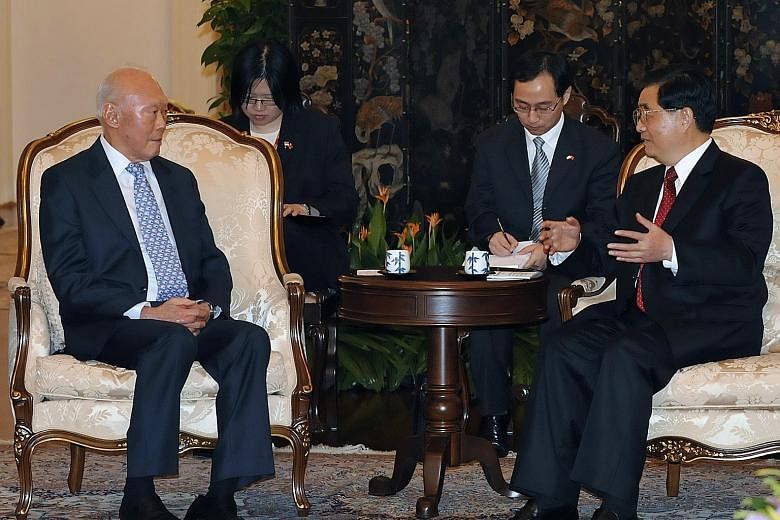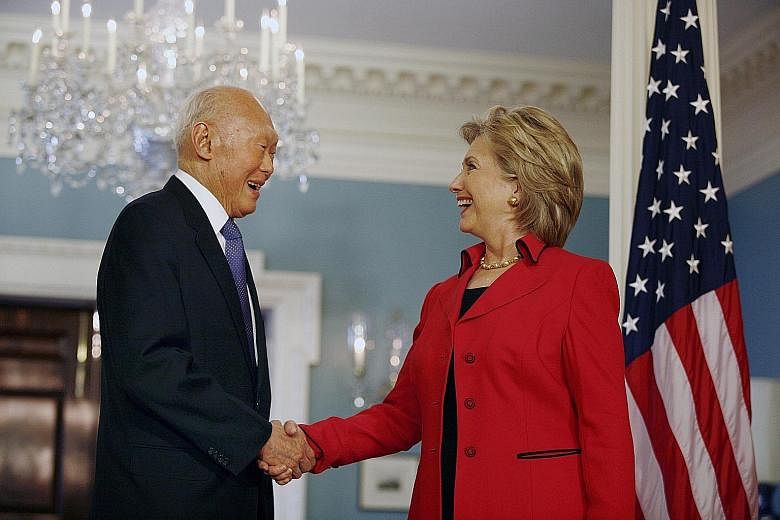The first and only time I wore a tuxedo was in October 2009, when I attended the United States-Asean Business Council's 25th Anniversary Gala Dinner together with Mr Lee Kuan Yew. I was then his principal private secretary, which was a privileged position that offered excellent learning opportunities, and was also the best job I ever had in my 17 years with the civil service.
The council presented Mr Lee with its first Lifetime Achievement Award to honour his contributions to strengthening US-Asean relations, and for his unwavering support over the years for the US to remain a stabilising force in the Asia-Pacific.
Mr Lee was a firm advocate of having a balance of power to create a conducive global environment and international order for small countries like Singapore to survive and prosper. This was true during the Cold War, when US presence was crucial in preventing the spread of communism in South-east Asia. It remains true today. In his speech at the gala dinner, Mr Lee said that "the size of China makes it impossible for the rest of Asia, including Japan and India, to match it in weight and capacity in about 20 to 30 years. So we need America to strike a balance".
Mr Lee's remarks did not go down well with some commentators in China, who criticised him for not taking China's side despite being an ethnic Chinese. These critics missed the point. Mr Lee was not taking sides with the US or China; he was doing it for Singapore. Top Chinese leaders understood this and did not take exception to his support for the US presence, and valued his advice.
Mr Lee was always looking at ways to advance Singapore's interests and to improve the lives of Singaporeans. He believed that having a balance of power in the region would facilitate China's "peaceful rise" (a term coined by Chinese scholar Zheng Bijian and used by various Chinese leaders), which in turn benefits Singapore and other countries in Asia.
But the reactions of the Chinese commentators to Mr Lee's speech also revealed how many Chinese assume that because Singapore is a Chinese-majority country, we would automatically be sympathetic to China's interests, and that we should support them when they have disagreements with other countries. They are wrong. Singapore is not a Chinese country and we are not a mini-China. We are a multiracial, independent nation. We want to be good friends with China, but also remain friends with the US, Japan, the Republic of Korea, Australia, India, Russia and, indeed, all major countries, in order to safeguard our security, trade and international space.
When Mr Lee met former Chinese president Hu Jintao at the 2009 Apec Summit in Singapore, Mr Lee recounted a story to him. Earlier that year, the Chinese government had invited groups of overseas Chinese to attend the 60th anniversary of the founding of the People's Republic of China in Beijing. When the People's Liberation Army marched across the parade square with its equipment and weapons, the overseas Chinese from Thailand, Malaysia and Indonesia shed tears of pride and joy. To them, the motherland had finally risen! Mr Lee told Mr Hu that the only group of overseas Chinese who did not cry were the Singaporeans. Although Mr Hu did not react to the comments, I noticed that some of his delegation members shifted uncomfortably in their seats. They understood Mr Lee's point.
-
SINGAPORE REMEMBERS

To be sure, Mr Lee did not view China's rise as a threat. On the contrary, he saw it as a positive and inevitable development, with tremendous potential to create new opportunities and improve lives for countries and people in Asia. The key factor was whether the rise would be peaceful or disruptive.
He believed that continued US presence in the region would benefit all countries, including China. Unlike US-Soviet relations during the Cold War, the US and China do not have diametrically opposed world views and national objectives. The two countries do compete with each other in certain areas, but there are also many areas where they can cooperate for mutual benefit. Hence, Mr Lee felt that the US and other Western powers should welcome China's rise and encourage it to be a responsible stakeholder in the world order.
Mr Lee was neither a China dove nor a China hawk. He was more like a wise owl who understood the motivations and thinking of both Chinese and Western leaders. He had a pragmatic view of how geopolitical forces and the relationships between global powers would affect small states like Singapore.
A retired French president once told Mr Lee that the Chinese were a peace-loving people. Unlike the Europeans, they did not colonise any country in their history, so the world should not worry about a rising China. In response, Mr Lee said that when the Sultan of Brunei was in Nanjing, the Chinese government took him to visit the grave of his ancestor who died in Nanjing many centuries ago while paying tribute to the Chinese Emperor.
The lesson for me was clear - China is an ancient civilisation which used to dominate the region. It is always unwise for small countries to depend on a larger neighbour's benevolence and goodwill for their survival. If there is no balance of power in the region and we cannot defend ourselves, our interests will likely be undermined and our international space will be curtailed.

To achieve this balance of power, Mr Lee wanted to persuade American leaders to withdraw from Afghanistan and shift their focus to Asia. In his speech at the US-Asean Business Council Gala Dinner, Mr Lee told the audience: "In the end, whatever the challenges, US core interest requires that it remains the superior power on the Pacific. To give up this position would diminish America's role throughout the world."
He conveyed the same message when he met President Barack Obama and then-Secretary of State Hillary Clinton. During the meeting with Mrs Clinton, Mr Lee asked me to bring along a copy of Rudyard Kipling's poem "The Young British Soldier". He recited the last few lines to Mrs Clinton to reinforce his point on why the US should pull out of Afghanistan and focus more resources on the Asia-Pacific region.
"When you're wounded and left on Afghanistan's plains, And the women come out to cut up what remains, Just roll to your rifle and blow out your brains And go to your God like a soldier."
In his interactions with world leaders, Mr Lee was always able to navigate the international arena adroitly, advancing Singapore's interest and maximising our political and economic space every step of the way. He was an exceptional leader, with a single-minded focus on doing what was good for Singapore.
It has been a year since Mr Lee's passing on March 23 last year. As we think about what Singapore has gone through over the past 50 years and our challenges ahead, it is important for us to stay the course and build on the foundations which he and other pioneer leaders have put in place.
We are now in a more complex and interdependent world, with many emerging threats, but also many promising opportunities. To succeed, we have to stay connected with the world and continue to be a cosmopolitan city which welcomes talent and ideas. We must remain exceptional as one people, one nation, one Singapore. Together, we can follow the beautiful rainbow and build a bright future for ourselves and our children.
- Chee Hong Tat is Minister of State for Health, and for Communications & Information, as well as an MP for Bishan-Toa Payoh GRC.


